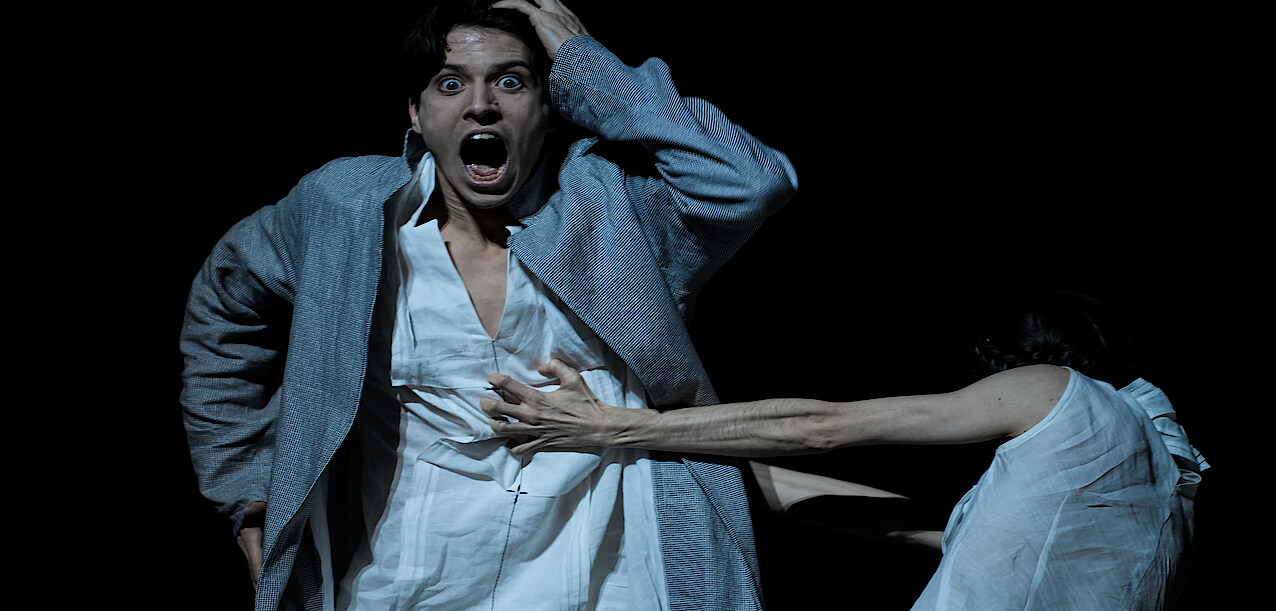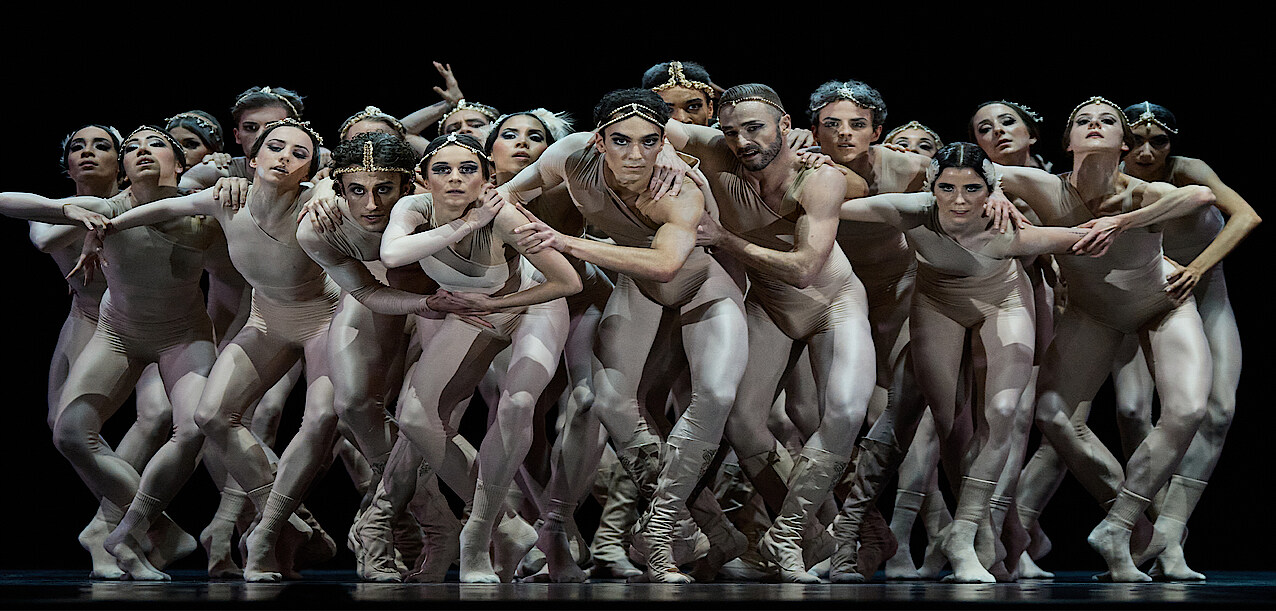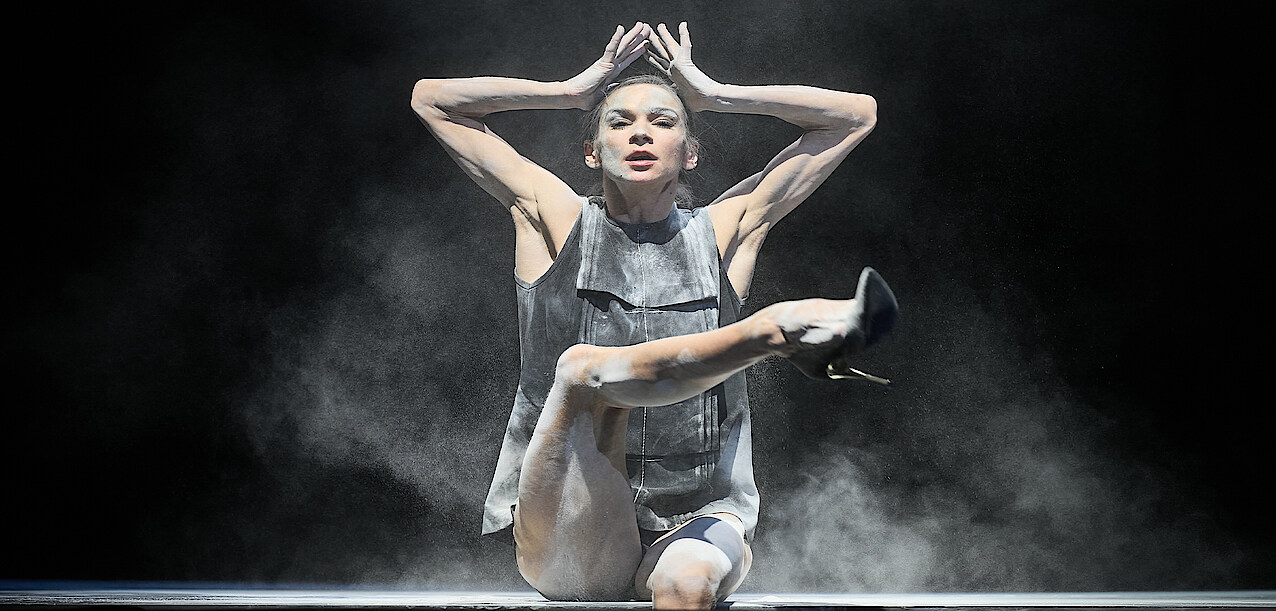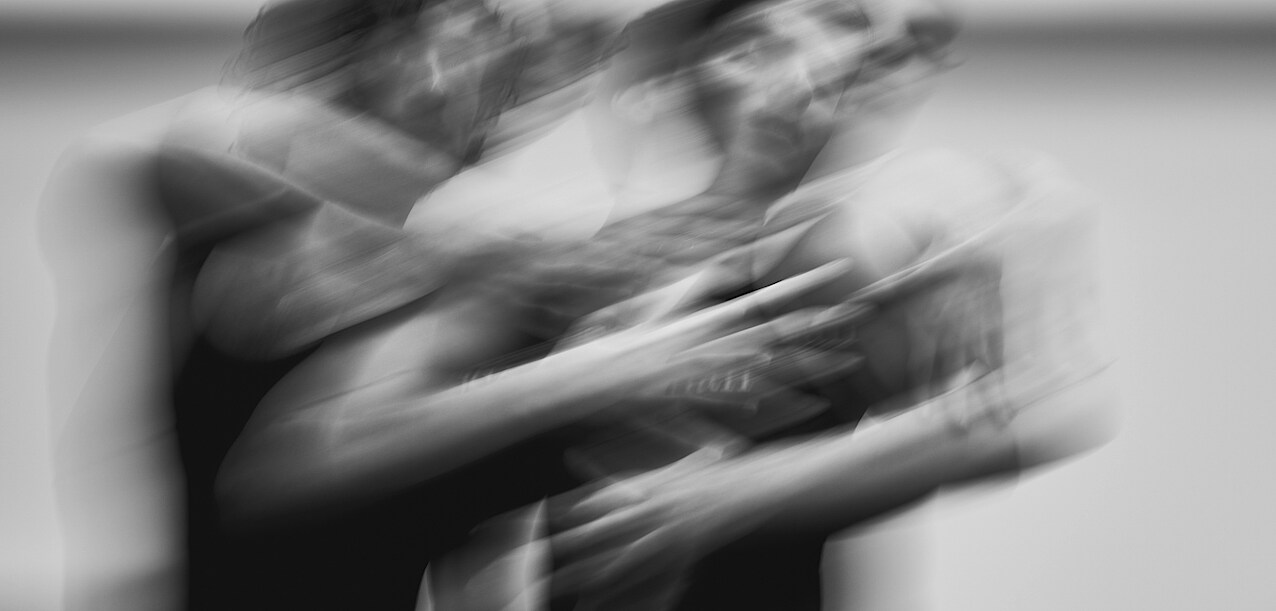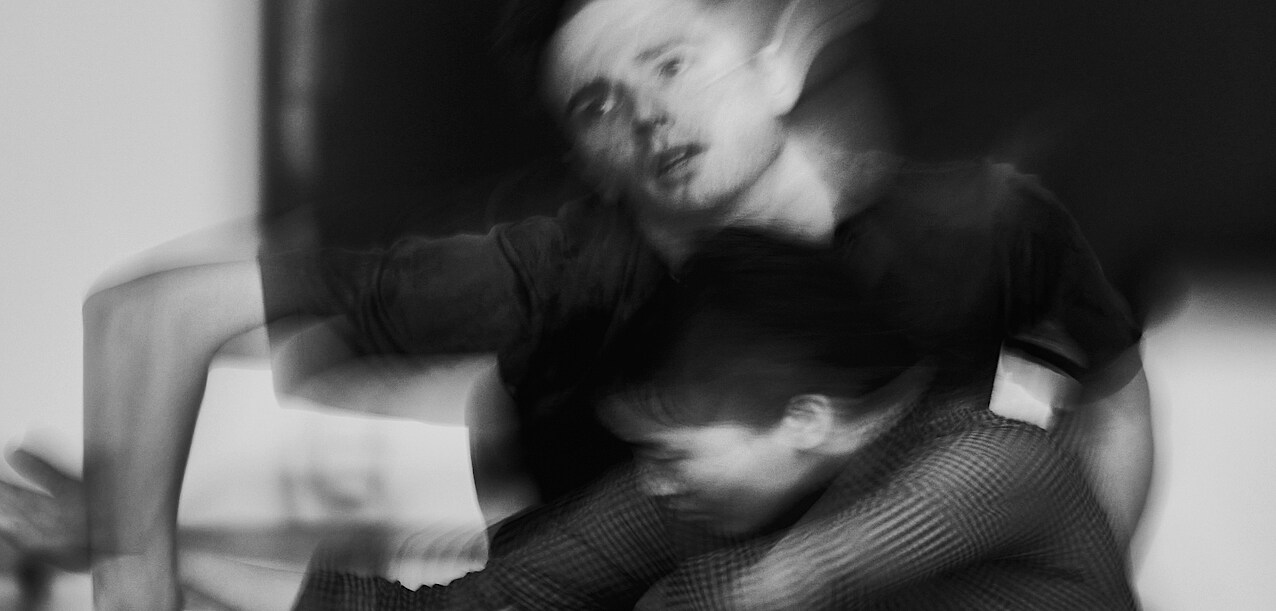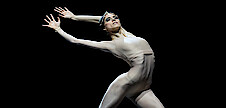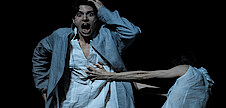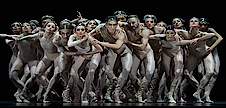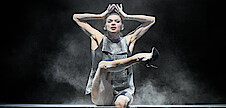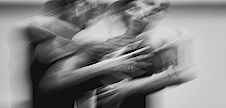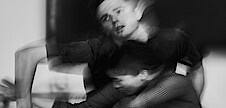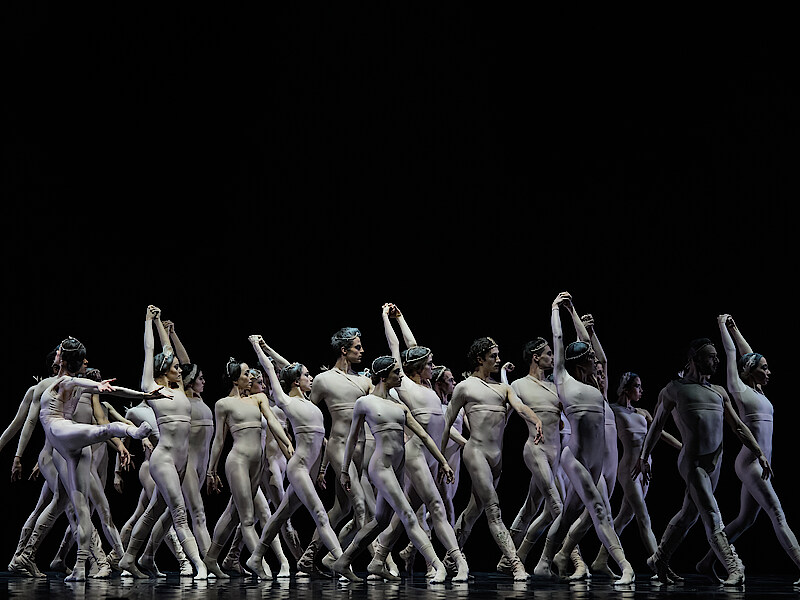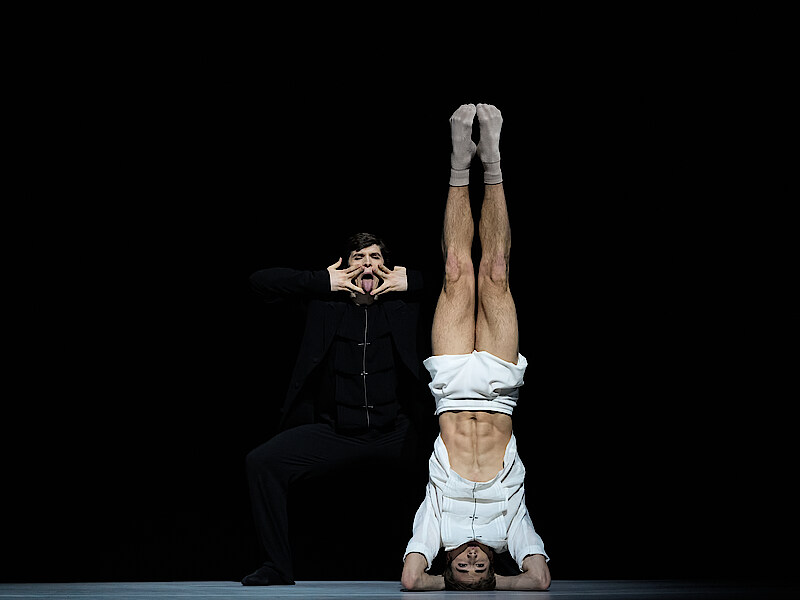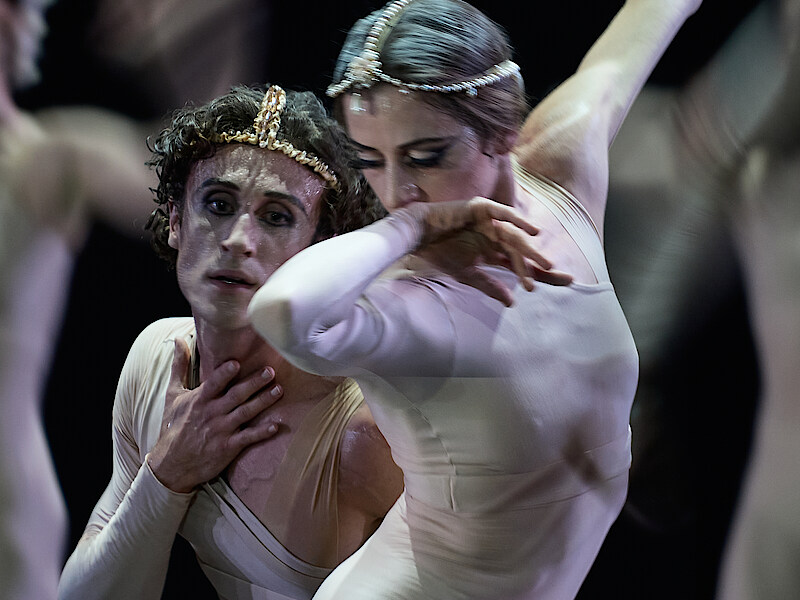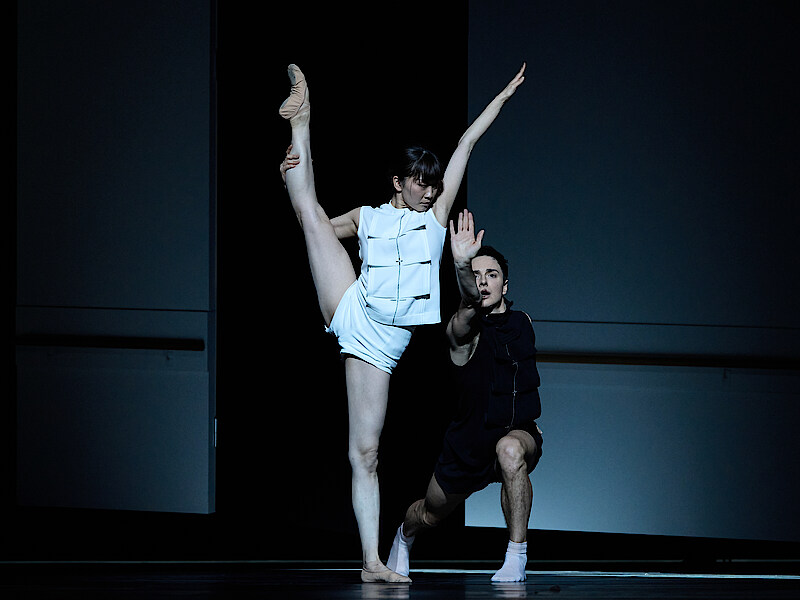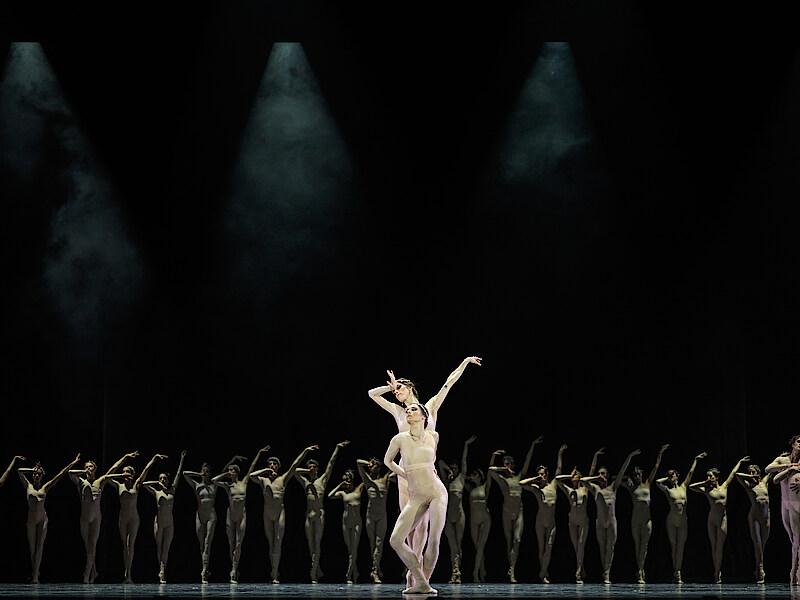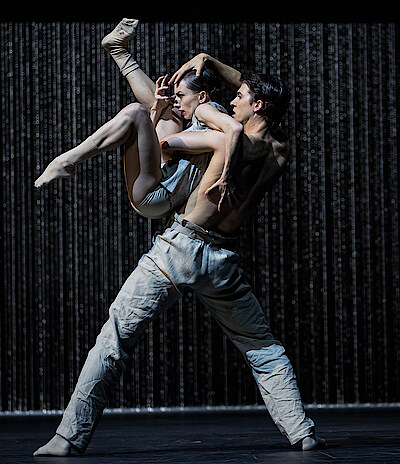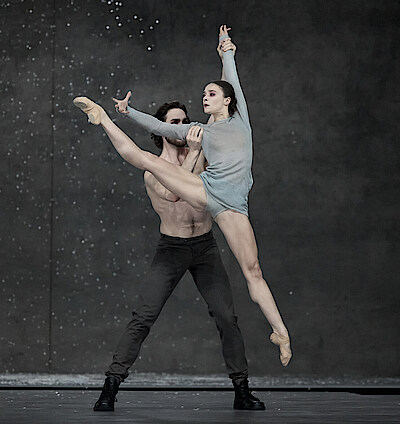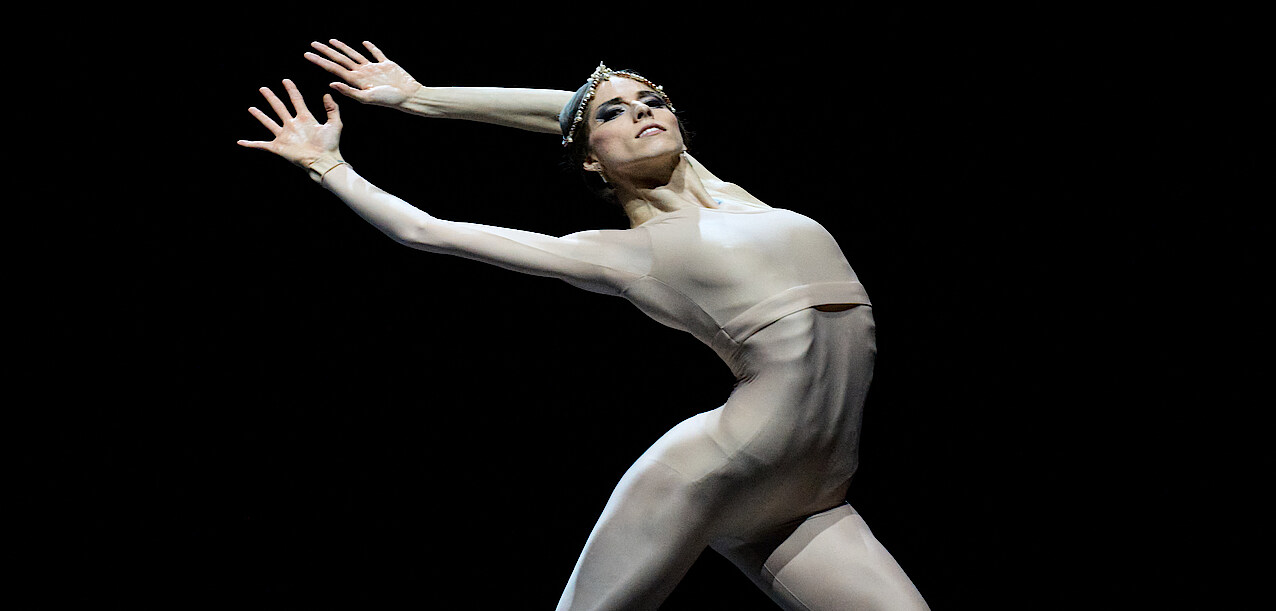
No further performances this season.
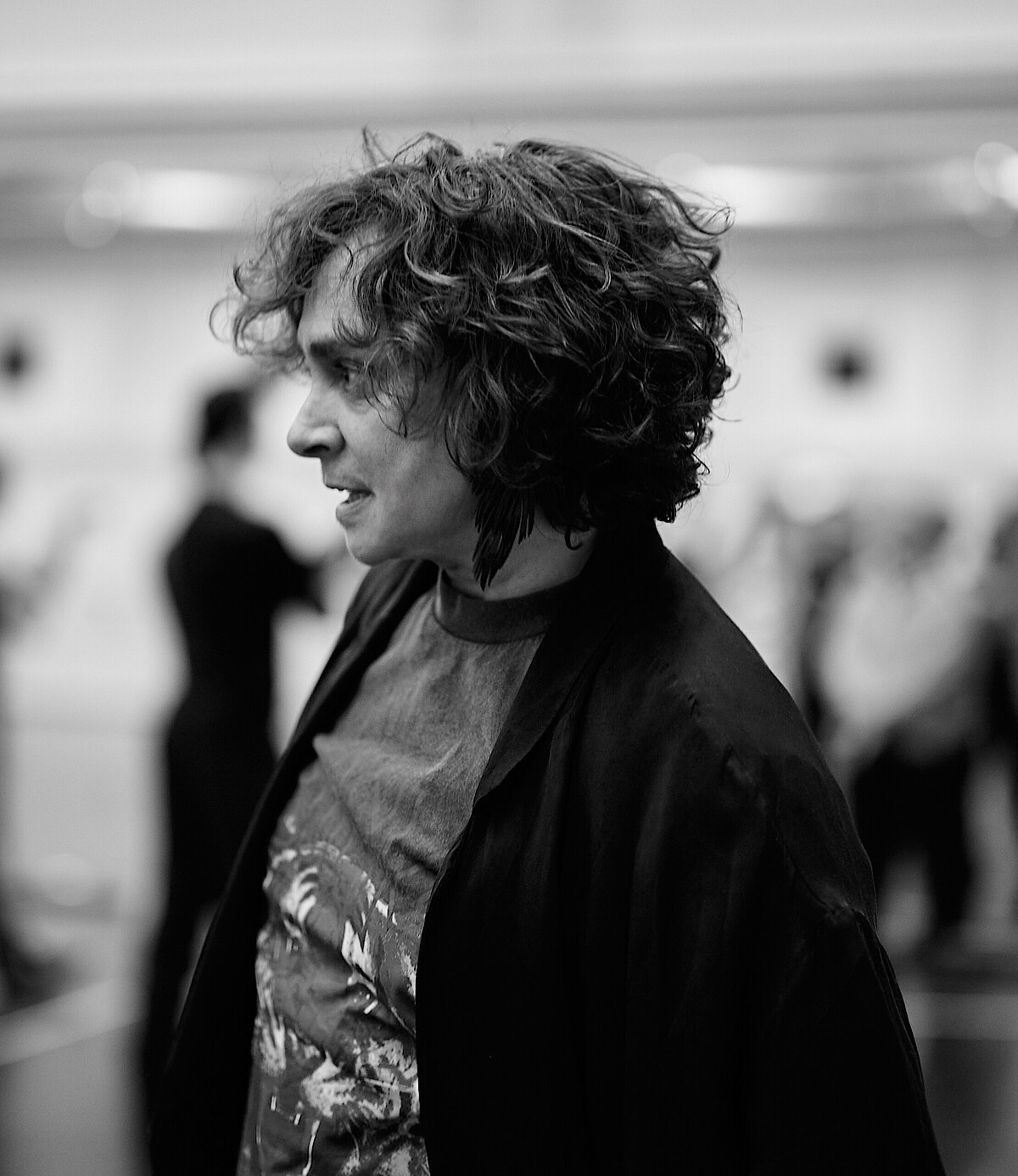
«Everything beautiful should be frightening.»
Sol León in conversation with Christian Spuck
Christian Spuck (CS) What does a new beginning mean to you? Is it something positive or rather frightening?
Sol León (SL) A new beginning may be frightening, but it's also beautiful. Everything beautiful should be frightening. My creation with you feels like I had been at home for 35 years, the Nederlands Dans Theater, cooking in my own kitchen with all the ingredients I had, for which I'm grateful. But now life is giving me this opportunity to do this in a new home with new people. And yes, it makes me nervous. But most of all I'm curious, and I'm looking forward to the experience.
CS Something which is probably easy to answer for you: How do you create? Where do you take your inspiration from? From the dancers? From the music? Do you already have a clear concept when you start, or is it all a process when you step into the studio?
SL I believe creativity comes out of the moment. If not, it's more like a recipe that frames the brain in between your fears, your demons and your wishes, which results in an unclear dance in your head. Now I will have to deal with many kinds of rules or ways which are new to me. How can creativity still come out of the moment under these conditions? The dancers will be my angels. That’s why the chemistry of who I choose to work with is very important. I'm always fascinated by the dancers' energy and personalities. What I want to express is more delicate, like a poem. I need distinct artists who are also sensitive human beings. I will be creating all by myself this time, without my partner Paul Lightfoot; all has to come from within myself. So, it will be what it will be. I am not going to try and make you happy, Christian!
CS That's actually the reason why I invited you.
SL You understand why it is like this. But I still want to try and honestly show what really is inside of me. We have a big responsibility being artists, haven’t we? So, forget about entertainment; forget about pleasing the audience; forget about being commercial. If it’s going to be a success, it’s very good for all of us, but that's not my main goal.
CS You just said that the creation comes out of the moment itself. So, it's a little bit like the painter in front of the white canvas who just has to start painting. Does stepping into the unknown make you nervous?
SL You can make thousands of plans, but then you arrive in the studio with these dancers and it's something else. And I love it. That's the passion of life. You're not afraid to embrace your lover.
CS And what do you do when you sense, «I don't know how to continue.» Have you ever experience that?
SL To be stuck is a precious pearl within the flow of creativity. The challenge lies within myself when I become anxious or impatient. I don't like it. The tricky part is to translate to others what I know I want.
CS I know that you know what you want.
SL Yes, I do. Some years ago I got sick. So, in the studio, I could neither see nor speak well. But I felt comfortable and protected by the people around me. It was nearly telepathic. They knew what I wanted in that moment. We shared this precious gift together. But I wonder how it will develop with people who have never created with me before. They may think I'm crazy?
CS I think craziness is a good start for a creation. If you had the chance to start your life all over, and you could not decide to become a choreographer, what job would you choose?
SL I will choose the same, but maybe name it differently. But I would definitely do it again. I think I was four or five years old. Everybody laughed at me and said, «And you little girl, what are you going to be?» And I said, «I'm not 'going to be'. I 'am' a dancer.» You have to know, I was the youngest among the children. Talking was not the solution for me to be, but dancing was. I didn't realise that dance and choreography were separate. For me, it was the same thing.
CS We live in a state of crisis at the moment. The world is a big mess. How does it affect you, and how does it influence your work?
SL It has an influence on me because, as I said earlier, as artists, we have a big responsibility because of our capacity to express what’s going on. For example, for me, what we are doing to the planet is absolutely wrong. Having 30 degrees in San Sebastian in winter, that's quite scary. But in these times, I still want to think positively. I'm working with Ukrainian dancers right now. They're refugees, and it's amazing what we learn from each other. We take the opportunity to be together and share the unknown. Of course, the situation is horrible, but we take something away from it. It's like water. When you pour water into a closed container, it always finds a little space in the corner to leak out. I think positively, that's the way it works.
CS So even in dark times, there's always a form of positivity that allows us to find hope?
SL Of course! This is not a world of pure negativity. You know, I had very difficult experiences in the past two years. One of them was the loss of my parents. They were at a very old age, and their death was to be expected. But still, you have to confront questions like, «What is death? What is the body? Where is the spirit?» But my main feeling above all the sad circumstances was love! Love is a vulnerable and subtle state of being, and it has its own frequency, over here or over there. I love my parents more than ever; I can see them more than ever. They are inside of me all the time. So, what is it? This is the idea that attracts me. How can I make these sparkling things visible?
CS You are a world-known choreographer, and this has a lot to do with your long-time involvement with the Nederlands Dans Theater, a world-famous company. Now you'll work with the Staatsballett Berlin. Do you believe it's going to be different?
SL There is one thing that interests me the most. When I work all over the world, I’m mostly worried about time limitations, the rules that maybe are not flexible, all these things. For me, quality is the most important thing to achieve. So, when I go elsewhere, I believe all dancers in the world have this wish for quality in their DNA. They want quality, don’t they?
CS I agree. I think the dancers are really hungry for perfection. They love to be as good as they can be. That will satisfy them, totally. Sometimes, unfortunately, institutions limit this. You have to fight for the freedom of art which, in the end, sometimes is only to have enough time and space to create, and to find the best possible way.
SL But I have to say: I am a beast!
CS You are a beast, I know. [Both laugh]
SL I cannot control it.
CS I would be more worried if you ran across me in the hallway and told me: «All is going to be fine.» Then I would be very worried.
SL You know that is not going to happen. [Laughs] I always want more. I can never stop. So, that's my passion.
CS I have one last question. I think you answered it already, but we want to ask everyone this question. How personal is your choreographic work?
SL It's my soul.
CS That was a perfect closing sentence. Thank you for this conversation, Sol.
Quoted from the 23/24 season brochure.
«I’d describe Berlin as colourful with a black and white feel.»
Sharon Eyal in conversation with Christian Spuck
Christian Spuck (CS) What does a new beginning mean to you? Is it something positive or is it rather something frightening?
Sharon Eyal (SE) Honestly, there is no new beginning because it's all about the ending. A beginning is actually the end of something. So for me, it’s all one thing!
CS Which role does the city play in which you live or work in? How about Berlin?
SE It has a lot to do with emotion and energy and timing. Also, it's all connected to the moment. I love Berlin, I had some amazing experiences here with the Staatsballett, and also our own company [L-E-V Company] performing at Kraftwerk Mitte. There is something very open about this city. I'd describe Berlin as colourful with a black and white feel.
CS That’s a beautiful image. When you create, where do you take your inspiration from? Do you create a concept first?
SE I think I cannot create «something». It’s rather that I have different forces in my body and my heart so that I have to create. I have to dance, and I have to deliver something from inside of me. Inspiration is not something I can point at. It's all about experience and moments and people, my family, and my love, all these moments and more, the sky or the night. Inspiration is in the air, you just need to breathe it.
CS Is it easy to breathe it or is it also difficult sometimes?
SE It's never easy for me. Nothing is easy. I cannot relate so much to easiness. But I also don't want to say it’s hard. Breathing contains a lot of colours. It's, again, everything. It's very minimalist in a very maximum way.
CS How important are your artistic collaborators like your dancers, composers and costume designers?
SE I believe in collaboration, and I really believe in the people around me. They are another source of inspiration: music, costumes, lights, dancers and, of course, my husband [Gai Behar], who I'm working together with. For me, it's all about the people. It can truly change something within the piece. It's a lot about chemistry. It's a lot about wishing for something and looking at the same star together. There is something bigger that everybody wants to reach. So, the people are extremely important.
CS Isn't that a beautiful moment when you sense that all somehow merge into one unit?
SE It's amazing. And it's very special when it happens.
CS Yes, I know exactly what you mean. Sometimes you have to fight the fear so much at work until you get there. But when it suddenly happens, it's just worth all the suffering.
SE Magic.
CS Yes, magic! That's the right word. When you start a new work or a new creation, are you afraid of the white canvas, when you have to make the first decision? Sometimes I'm afraid of that.
SE I don't start with a white canvas, I continue. So for me, it's never a starting point, it’s a process. I always will be afraid, and I will always have emotions. But I think this also gives me a lot of energy. Maybe ‘afraid’ is not exactly the right word. Maybe I have ‘anxiety’ or I feel uncomfortable with myself. But at the same time, it's the only way I can start.
CS So, when you start a new creation, do you re-visit and simultaneously continue the work you did before? Or do you relate to your style in general by maybe reflecting it?
SE No, I don't relate to anything, and it can be completely the opposite, too. It’s more like remembering a taste in your mouth or a face, something you want to keep. It’s not that I necessarily refer to my last creation or my style. It's more like a signature, something that already exists.
CS Instead of being a choreographer, what would you have liked to become instead? What could be fulfilling in the same way for you?
SE It's very strange for me to think about something else because this is me. There is creation and dancing and feeling; all this is me. Choreography will always be the art in which I will express myself. I really love what I'm doing.
CS Do you remember the moment you knew, «I must dance»? Was there an initial spark when dance suddenly said, «I want Sharon Eyal»?
SE I was four years old when I started, I created for the first time when I was thirteen. I have been dancing all my life, but I don't know exactly when dance chose me. I think I was just there.
CS You're very aware of what's happening in the world at the moment. It's really in a very desolate state, and it's full of crisis. Does this affect your work?
SE I'm living this life, and I'm just sad that all this happens. It's hard for me. But I hope that, nonetheless, you can connect with people. I want to share what I know. I think, if more art will be created, there will be more love, more peace and happiness.
CS I really like to think back on our meeting in Paris. Somehow it was very special to me. There was a moment I cannot forget. We were sitting outside talking, and then the sun came out. Then you said, «Let's go inside, please. I'm a moon girl, I cannot bear the sun.» That is very poetic. Instinctively, I learned a lot about who you are. But what is the deal with the moon girl?
SE I think I'm just more moon than sun. The moon is so strong; I relate to the moon. I cannot really be in the sun. I have sensitive skin. I like darkness because I feel better in the dark.
CS Again, you will do a creation with the Staatsballett Berlin. It's your third time working with the company. What do you like about the Staatsballett?
SE Everything. I love the dancers. I love the management. I love to be there. And also, I really love to come back to places where the dancers have already internalised my language. Usually, this takes time. I think the dancers in Berlin find something in me. I love the technique of classical dancers. My work needs that, this crazy technique and this even crazier professional feeling, this total dedication. All this makes the work even more physical and more extreme. I love working here; I have always loved it. I think it will be amazing!
CS So, if you would do two creations at the same time, let’s say one in Paris and one in Berlin, would they look similar or completely different?
SE Maybe they would look similar but feel very, very different. My thesis is, you can feel it's me, but still there are different human bodies, human souls on stage. You can feel it's me, like a stamp.
CS I have one last question. You answered it already, but maybe you can find a short answer. How personal is your choreographic work?
SE I think my choreographic work is nothing but personal. There is no difference between me and my work.
CS It's about you, actually.
SE It's about me, but it also isn't. It comes from inside of me, but the moment a company is involved, it's not me anymore. It comes from my own personal feelings, but it's also universal. I think when you connect to your own emotions, and you create something from within, people connect with it because we are all one and the same.
CS Thank you very much, Sharon.
Quoted from the 23/24 season brochure.
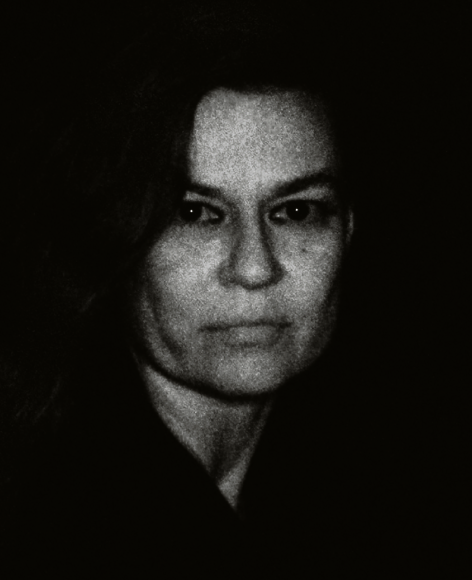
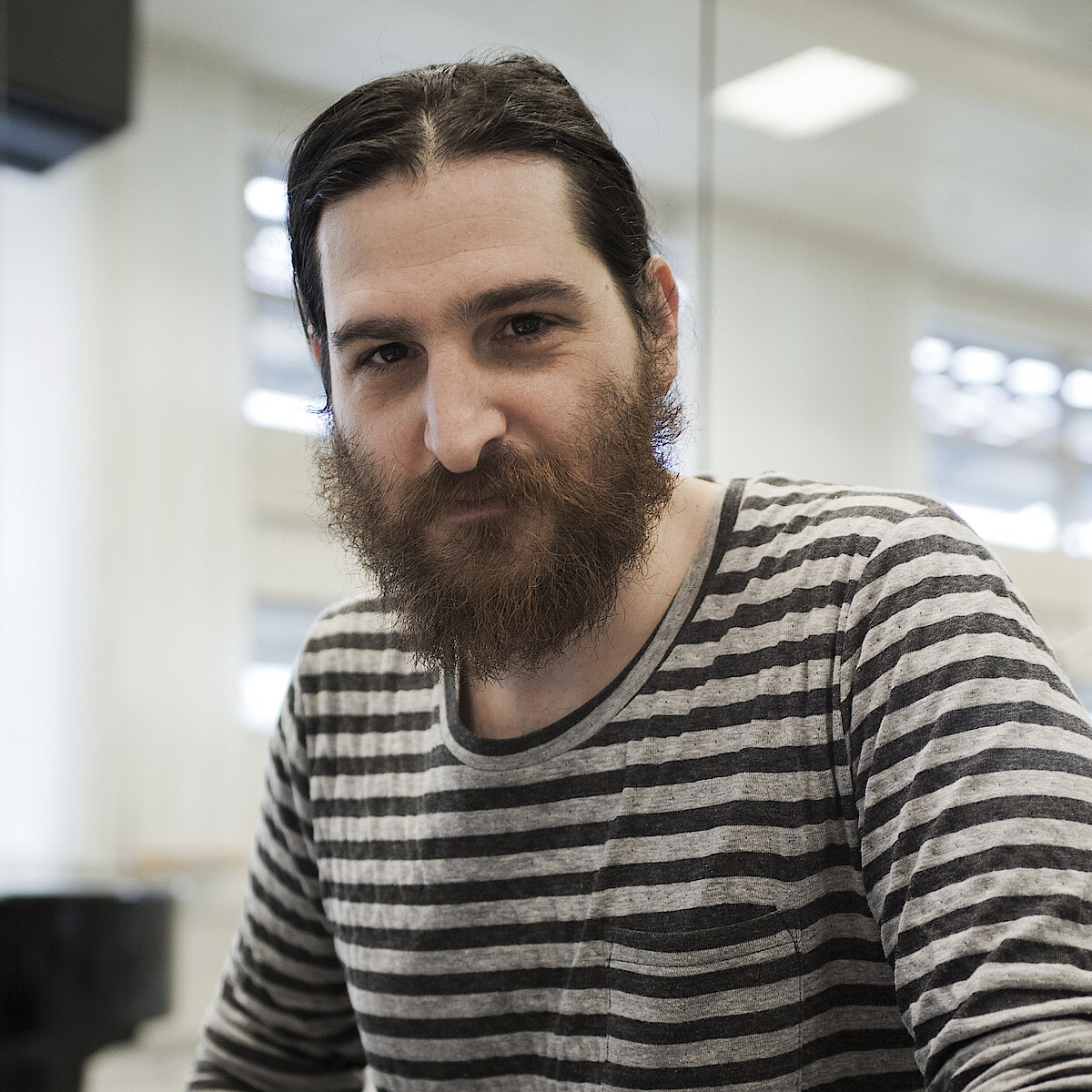
«It always starts with Sharon»
Musician Ori Lichtik on Sharon Eyal, her uncompromising aesthetic, and his love for techno music.
Staatsballett Berlin (SBB) You have been collaborating with Gai Behar and Sharon Eyal for a long time. What is the basis of your collaboration?
Ori Lichtik (OL) It's not like we've thought about it, but it was obvious that we share some commonalities. For example, my view on music and Sharon's view on dance, or even her view on music. Even though we have different tastes. She likes pop music or very romantic stuff, which doesn't fit naturally into my musical environment. That's nice because then we find out where it can exist in our world. But our musical commonality lies in minimalism, in subtlety. And we don't compromise on energy.
SBB Do you come to a rehearsal with an idea for the track, something you'd like to try? Or does the idea come from Sharon?
OL It always starts with Sharon, because of the way she works with the dancers. That's why we need to have a common ground first, an agreement on aesthetics. The dancers are also very important. It's not that I ignore the audience in the theater, but I play for the dancers. If the music works for them, then it will work for everyone. At the beginning, their feedback is extremely important. Nothing can happen if they don't have some interest or joy in it in some way. Sometimes Sharon comes with a song idea. Then there's a new choreographic section from this song to the next. Sometimes the song doesn't end up in the piece at all, but it's there during most rehearsals. Sometimes I come up with some ideas, like from an older piece. Then I just play with it, and Sharon and the dancers start dancing to it. We record everything with the camera. In "Love Chapter 2," for example, these studio sessions are a big part of the piece. There's a large section that we narrowed down during rehearsals, one to two hours of dance footage that we compressed into 20 minutes.
SBB That sounds like a very organic way of working, seeing what emerges from the moment, with the music and the dance...
OL I think this way of making music and how Sharon approaches it is the reason why we work together. I also have a band, Avaq, where I play drums. When I create and record my own stuff, that's also a very organic process. I just play and then take the result, cut it, and clean it up. And then Sharon dances to it. Sharon takes the tracks to the studio, and her dancers dance to them. Sharon sometimes says that the dancers "dance" too much. Because it's more about being in motion and that the movement should come from inside: from the stomach and the intestines. And then everything is very meticulously sewn together. I would say that's her very strong and uncompromising aesthetic, a mix of that kind of dance with a good kind of techno. It's very sophisticated and very precise.
SBB Have you been musically connected to Berlin in your past?
OL I know there's an expectation for me to have a certain opinion on this topic, but to be honest, nowadays I'm not in the club scene at all anymore. I was, of course, in the past; I've done underground parties. But I don't consider myself an "authority figure" to say anything about the scene. Berlin and Germany have always been places of inspiration for me. I played once in the old Tresor club before they moved, and it was a crazy experience, a bit too crazy, but it was incredible. It was just a good and uncompromising dance experience to a great set. Tresor is also a label that I've been collecting since then. I believe the first 20 records I bought are all from this label.
SBB How do you feel when the audience in the theater, or the critics in newspapers, describe your music?
OL If it's a bad review, it affects me. But I try to understand what they mean, especially when it comes to my techno music. I love techno and stand by it. For me, there are qualities in techno that relate to the space. They are essential to the core of the place, to the way you can experience it. Sometimes it's downright degrading for me when others don't see it that way.
Quoted from the Ballet Paper No. 1. The conversation was conducted by Katja Wiegand.
